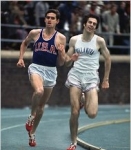Forty Years After a Dream Mile, a Harsh Reality for Track

By Tim Connelly, The New York Times
The news that the Millrose Games are leaving Madison Square Garden after 97 years to relocate uptown to the 168th Street armory reminds us of how indifferent we are to track and field. And yet, in a coincidence of timing, we remember, too, that we were not always this way. Friday’s announcement came almost exactly 40 years after an event that placed the sport, however briefly, front and center in the consciousness of the American public.
On May 16, 1971, Marty Liquori and Jim Ryun went head to head at Franklin Field in Philadelphia in what was billed as the Dream Mile. Maybe it did not generate the overheated water-cooler conversation that anticipated Ali-Frazier two months earlier, but in an era of unusually outsize sports personalities, when malevolence of thought and deed were imputed on the slimmest evidence, the Dream Mile fueled a rousing simmer. Like Ali-Frazier, Liquori-Ryun lived up to its hype.
The contestants were a promoter’s dream. It was easy to pick a side. Ryun was from the Midwest heartland, quiet and self-effacing, with a devastating kick. Liquori was from the urban Northeast, cocky and brash, a front-runner who lived to push the pace. Together with Kip Keino of Kenya, who was invited but declined, they were the pre-eminent milers of their day.
They had a history, too. When Ryun, an established star, ran a Mile world record 3 minutes, 51.1 seconds in Bakersfield, Calif., in 1967, Liquori, a high school senior, finished seventh, dipping under 4 minutes for the first time. Ryun won their first six meetings, Liquori the next two, including the Amateur Athletic Union Championship in Miami in June 1969, when Ryun walked off the track after two laps. Ryun called it a “mental breakdown.” He did not race again for 19 months. When asked if he missed Ryun, Liquori said, “I don’t think Wilt Chamberlain misses Bill Russell very much.”
On a cool, damp Sunday in Philadelphia, four months after Ryun began his carefully calibrated return to racing, he and Liquori resumed their rivalry at the Martin Luther King Jr. Freedom Games. The cast included the Olympic medalists John Carlos and Lee Evans in the sprints and Bob Seagren, the world record holder, in the pole vault. On that day, though, everything else was undercard.
I was there with my father. I recall Ryun warming up, running full turns on the interior track: a series of languid jogs, then of gradually lengthening strides and finally of full-out sprints. It seemed as if he had run five miles to prepare for one. It was a revelation to a novice not yet 15.
Liquori emerged from the tunnel as Ryun was finishing. I believe they shook hands. Ryun, at the starting line, was introduced to resounding cheers. This being Philadelphia, Liquori, the local kid from Villanova, was booed.
Continue reading at: nytimes.com
